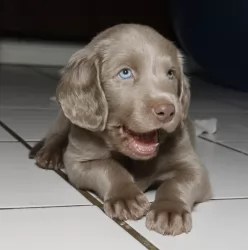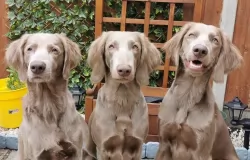 MyDogBreeds
MyDogBreeds Longhaired Weimaraner is originated from Germany but Austrian Black and Tan Hound is originated from Austria. Longhaired Weimaraner may grow 14 cm / 6 inches higher than Austrian Black and Tan Hound. Longhaired Weimaraner may weigh 10 kg / 23 pounds more than Austrian Black and Tan Hound. Both Longhaired Weimaraner and Austrian Black and Tan Hound has almost same life span. Both Longhaired Weimaraner and Austrian Black and Tan Hound has almost same litter size. Longhaired Weimaraner requires Moderate maintenance. But Austrian Black and Tan Hound requires High maintenance
Longhaired Weimaraner is originated from Germany but Austrian Black and Tan Hound is originated from Austria. Longhaired Weimaraner may grow 14 cm / 6 inches higher than Austrian Black and Tan Hound. Longhaired Weimaraner may weigh 10 kg / 23 pounds more than Austrian Black and Tan Hound. Both Longhaired Weimaraner and Austrian Black and Tan Hound has almost same life span. Both Longhaired Weimaraner and Austrian Black and Tan Hound has almost same litter size. Longhaired Weimaraner requires Moderate maintenance. But Austrian Black and Tan Hound requires High maintenance
 You may be used to the sleek, silver shorthaired Weimaraner, but did you know you get a beautiful long haired version too? Known also as the Long Coated Weimaraner or the ‘Gray Ghost’, with its mesmerising amber eyes, the less common long haired variety shares a similar history as the more familiar short haired version.
You may be used to the sleek, silver shorthaired Weimaraner, but did you know you get a beautiful long haired version too? Known also as the Long Coated Weimaraner or the ‘Gray Ghost’, with its mesmerising amber eyes, the less common long haired variety shares a similar history as the more familiar short haired version.
The dog originates in Germany and was developed to be a hunting dog. It is believed that the silver dog dates back to the early 1800’s, and in 1897 the first breed club in Germany was formed to protect the future of this dog.
The longhair coat is recognized in all countries except the American Kennel Club.
 When Celts began settling in Western Europe, they brought their dogs along. The Celtic Hounds had a duty to hunt, guard and fight in battles. They were, most likely, the ancestors of breeds like Greyhounds and Irish Wolfhounds. The original Austrian black and tan hound was created in Austria during the late nineteenth century. They were very specific dog breed because of their sharp nose, agility, speed, trainability and extraordinary persistence while hunting or tracking.
When Celts began settling in Western Europe, they brought their dogs along. The Celtic Hounds had a duty to hunt, guard and fight in battles. They were, most likely, the ancestors of breeds like Greyhounds and Irish Wolfhounds. The original Austrian black and tan hound was created in Austria during the late nineteenth century. They were very specific dog breed because of their sharp nose, agility, speed, trainability and extraordinary persistence while hunting or tracking.
 The Longhair Weimaraner with its eye-catching grey coat is a large dog that stands between 58 and 70cm and weighs between 25 to 40kg.
The Longhair Weimaraner with its eye-catching grey coat is a large dog that stands between 58 and 70cm and weighs between 25 to 40kg.
These dogs, unlike the short haired version, have the tail traditionally long and the tail is feathered. The eyes are a blue-green, amber or grey color. The grey coat is soft and silky and even though it is quite long, a brush twice a week will keep it in tip-top condition.
The Longhaired Weimaraner’s temperament is the same as the short haired variety. He is also a superb field dog with excellent hunting skills.
They’re very active dogs, looking for plenty of mental and physical stimulation. For first-time dog owners, this might prove to be too demanding, so the long haired Weimaraner might not be the best first-choice dog to get.
They can be aggressive when meeting new people and he will certainly require training and socialization if you want him to be calm and obedient.
 The Austrian black and tan hound is one of the larger dog breeds. The coat colour of this breed is unique: the coat must be black with small and defined fawn markings. The body, head and legs are black, with dark or fawn markings with the fawn marks above the eyes.
The Austrian black and tan hound is one of the larger dog breeds. The coat colour of this breed is unique: the coat must be black with small and defined fawn markings. The body, head and legs are black, with dark or fawn markings with the fawn marks above the eyes.
The Black and Tan is a smooth coated, slim breed with the broad chest and a wide skull shape. Their teeth meet in a scissor bite. They don’t have very long ears and their tail is long and slightly bent.
 Your Long Haired Weimaraner is a friendly, alert dog that makes for an excellent companion and watchdog. The fact that he is also restless, confident, independent and strong-willed means that training and socialization will be necessary to make him pleasant and obedient.
Your Long Haired Weimaraner is a friendly, alert dog that makes for an excellent companion and watchdog. The fact that he is also restless, confident, independent and strong-willed means that training and socialization will be necessary to make him pleasant and obedient.
You can’t always count on him to be amicable as he also has a bit of an aggressive side.
The way your Long Haired Weimaraner turns out will depend on heredity, the personality of the owner as well as training and socialization.
These dogs want to be with their human family and will follow the owner around and contentedly lie at their feet. Once he's trained, the Weimaraner is guaranteed to make you a fine family companion.
 The Austrian Black and Tan Hound get along well with strangers, other dogs or any animals. If they are not trained, their instinct to hunt will be a problem for other, smaller dogs and small animals. This is why this breed can’t be a guard dog. He is usually very friendly, and he remains friendly in most situations. It is very easy to train and socialize them, but you must remain firm while teaching them right from wrong. They are not the breed for the indoor, apartments or senior citizens. If you are not able to fulfil his daily need for activity, he can become quite destructive.
The Austrian Black and Tan Hound get along well with strangers, other dogs or any animals. If they are not trained, their instinct to hunt will be a problem for other, smaller dogs and small animals. This is why this breed can’t be a guard dog. He is usually very friendly, and he remains friendly in most situations. It is very easy to train and socialize them, but you must remain firm while teaching them right from wrong. They are not the breed for the indoor, apartments or senior citizens. If you are not able to fulfil his daily need for activity, he can become quite destructive.
Nonexistent for the last 30 years. But, if the dog gets mistreated, neglected or threatened – this breed knows to be aggressive. But, if you are a good and loving owner who makes sure that your dog is well raised, fed, loved, trained and socialized while he is still a pup, you will have no reason for the fear.
 Hip Dysplasia is a medical threat to all dog breeds and fortunately the Weimaraner is a dog breed that has a low rate of dysplasia. When buying a Long Haired Weimaraner, try and get one from breeders who have had their breeding dogs hip-tested.
Hip Dysplasia is a medical threat to all dog breeds and fortunately the Weimaraner is a dog breed that has a low rate of dysplasia. When buying a Long Haired Weimaraner, try and get one from breeders who have had their breeding dogs hip-tested.
You’ll notice that the Weimaraner is a deep-chested dog and he is prone to bloating, which can turn out to be life threatening for your dog if not treated immediately.
The stomach twists and is swollen with no bowel movements. The dog is restless and in distress and needs immediate attention. To help, instead of giving one large meal which is gobbled up quickly, give him 2 smaller meals.
Skin allergies are also quite common in these dogs and you don’t want your silver dogs coat going off as it is his crowning glory.
If he is scratching, his skin is dry, red and itchy, get him to the vet as it can even be parasites at work, causing an allergic reaction.
 (hip or elbow joint malformation) can happen from injury or overuse of the joints since the Austrian black and tan hound is a runner and jumper.
(hip or elbow joint malformation) can happen from injury or overuse of the joints since the Austrian black and tan hound is a runner and jumper.
They have sensitive ears and they can suffer from ear infections. To avoid this, you must have regular vet checks and have a habit of regular cleaning - hygiene of their ears.
Caused by Demodex canis. If you notice hair loss, redness and scaling you must take your pet to the vet urgently since this disease can be transmitted humans.
 When you bring a Long Haired Weimaraner home, you will need to invest in brush and comb for his long hair. They’re active dogs and love nothing more than running in a field, rolling in mud and being very active.
When you bring a Long Haired Weimaraner home, you will need to invest in brush and comb for his long hair. They’re active dogs and love nothing more than running in a field, rolling in mud and being very active.
His coat will need to be brushed at least twice a week to keep it looking silvery and shimmering. Check the ears, eyes and teeth whenever you brush him and get used to cleaning his teeth regularly too.
If in doubt about how to keep your pet well groomed in terms of looks and health, speak to a dog expert, your vet or professional groomer.
Your ‘Gray Ghost’ dog has been a very successful hunting dog, and they are high-energy gun dogs. As a large dog he will have particular nutritional needs to fuel his energetic lifestyle.The dog’s high activity levels need to be taken into account when looking at his diet.
Buy the best commercially manufactured food. Add to his kibble some cooked chicken, brown rice or pasta and cooked or raw vegetables from time to time as well as bits of raw meat. Your dog will thank you for keeping his meals simple but nutritious.
 Austrian Black and Tan Hounds don’t eat a lot even if you might think that they do. The truth is that they won’t need more than the prescribed portions that can be found in the instructions of high-quality dry dog food per day. All you have to do is make sure they have 3 meals during the day until they are 6 months old, and later they can settle for two meals per day.
Austrian Black and Tan Hounds don’t eat a lot even if you might think that they do. The truth is that they won’t need more than the prescribed portions that can be found in the instructions of high-quality dry dog food per day. All you have to do is make sure they have 3 meals during the day until they are 6 months old, and later they can settle for two meals per day.
Don’t give them the freedom to eat as much as they want. That can cause serious health complications. Their stomachs won’t be able to digest human food because it is usually made with a lot of spices. You can feed them with treats like eggs, fresh cheese, fruits and vegetables are okay as treats but only if these treats make less than 10% of their daily portion.
This playful dog needs the daily dose of outside activities. The grooming is easy but it must be regular. Once-a-week brushing at least is necessary. They don’t need to be bathed regularly but you must check their skin conditions daily since they have high risks of skin diseases. Nails need to be trimmed since they grow too fast and ears need to be cleaned every day to avoid ear infections.
The Austrian Black and Tan Hound are like any hound: they have an excellent sense of smell and they love to explore. They like to run and they can run for miles. Any outside activity will be a good choice. They like to bark and they bark even when they are happy. They are usually friendly towards strangers and other dogs, so the dog park is a good choice as well. They will love being at playgrounds as well since they love children and they can be a great Frisbee partner.